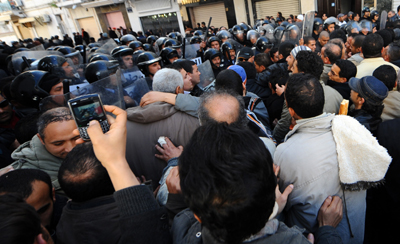Danny O’Brien/CPJ Internet Advocacy Coordinator
San Francisco-based CPJ Internet Advocacy Coordinator Danny O’Brien has worked globally as a journalist and activist covering technology and digital rights. Follow him on Twitter @danny_at_cpj.
Libya’s disordered Internet
Craig Labowitz at Arbor has been sifting through the evidence of how countries in the Middle East have been blocking and throttling the Internet in the last week. His analysis indicates that while both Bahrain and Yemen had periods of slowed or impaired access, only Libya seems to have taken the drastic step of shutting off the…
Egypt rejoins the Net
Internet connectivity has been restored to Egypt, though it’s hard to tell from the outside just how reliable that connection is. Monitoring organizations Renesys and BGPMon provide technical details on their blogs. For a more dynamic display, RIPE, the community which helps co-ordinate the European Internet, has a live graph of the numbers of Internet…
What the Internet loses from Egypt’s disappearance
Last night at 20:54 UTC, Noor Group, the only remaining Internet service provider in Egypt with a consumer broadband service, depeered with the rest of the Internet. There are now only 12 Egyptian networks connected to the Net, none of which appear to be offering public connections.
Will Tunisia’s ‘Internet revolution’ endure?
There has been a great deal written online about how much of a positive role the Internet played in recent events in Tunisia (if you’d like to catch up, Alex Howard’s link round-up provides a good summary of the many sides, both for and against). At CPJ, our focus is on slightly different questions: How…
Internet censorship halts in Tunisia
So much has happened in Tunisia since I last blogged on the large-scale phishing attacks against activists and journalists in the country. With the fall of Zine El Abidine Ben Ali, and a new interim government in place, online censorship seems to be ending. Opposition media and human rights sites are viewable, and CPJ’s Tunisia…

Tunisia invades, censors Facebook, other accounts
The Tunisian government has been a notorious censor for many years, for journalists online and off. In the wake of widespread domestic protests in December, however, the authorities appear to have turned to even more repressive tactics to silence reporting. In the case of Internet bloggers, this includes what seems a remarkably invasive and technically…
Six stories: Online journalists killed in 2010
This week, CPJ published its year-end analysis of work-related fatalities among journalists. Six of the 42 victims worked online. While you can read the full statistics and our special report elsewhere, I want to highlight the stories of these six journalists who worked on the Web.
Fighting bogus piracy raids, Microsoft issues new licenses
CPJ has documented for several years the use of spurious anti-piracy raids to shut down and intimidate media organizations in Russia and the former Soviet republics. Offices have been shut down, and computers seized. Often, security agents make bogus claims to be representing or acting on behalf of the U.S. software company Microsoft.
Facebook gets caught up in Egypt’s media crackdown
As CPJ has previously documented, journalists in Egypt have faced a deterioration in press freedom in the run-up to the parliamentary vote on Sunday. Editors have been fired, TV shows suspended, and regulations over SMS texting suddenly tightened. In the final few days, a new forum found itself caught up in this attempt to control…